When it comes time to choose a cup for your child, parents need to consider the effect that sippy cups have on speech development.
As a speech therapist specializing in oral motor development, I have very strong opinions about cup drinking. Teaching your toddler how to drink from a cup is a precursor to speech development, and making a smooth transition now will prevent problems down the road.
How Bottle Drinking Effects Tongue Position
There ain’t no shame in the bottle game. Bottle feeding is a quick, easy way for you to provide nutrients to your baby. It’s also a lovely way for your partner to bond with baby during mealtime. Perhaps you are doing a combination of breast and bottle feeding, or maybe you are solely bottle feeding. Whatever your choice is, I am sure you are doing what is best for you and your family.
Here is the thing about bottle feeding, though. Because breast feeding allows for babies to naturally learn the tongue and lip patterns that are needed for more mature swallowing (solid foods) and speech development, babies who are bottle fed do not have this experience. So, from birth, babies are learning unnatural patterns of tongue and lip movement.
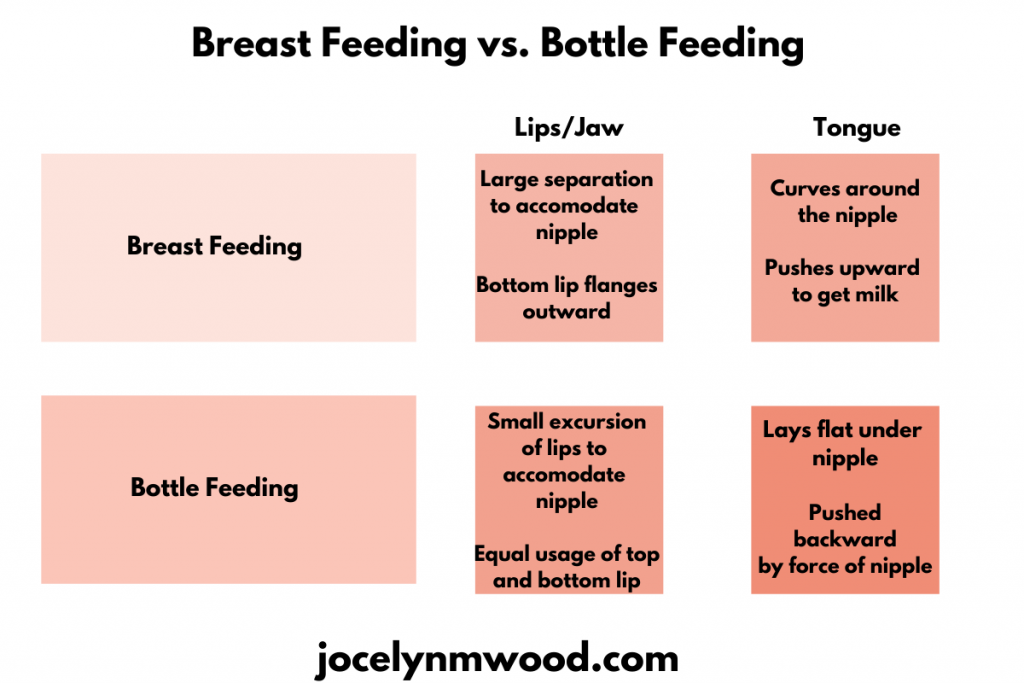
Then come teeth…
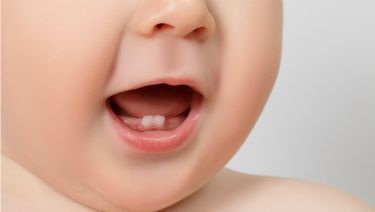
Around 5-6 months, many babies will begin mouthing their toys as they start to explore their world. Soon after, they will be looking to gnaw on some cold teethers as their first teeth emerge.
What you may not know, however, is that these teeth come equipped with “sensors” that tell them when to stop growing. Teeth will only grow until something disrupts their path (i.e. gums, other teeth, tongue). This also applies to bottles, meaning that providing a bottle after teeth begin to emerge can have an impact on the growth of baby teeth.
How Bottle Drinking Can Effect Speech
Ok, so here’s what we know so far:
- Bottle drinking pushes the tongue down and back
- Bottles can block teeth from growing to their full potential
- Bottles can push the palate (top of mouth) upward if sucking is forceful
What Does Bottle Drinking Mean for Speech Development?
For many children with prolonged bottle feeding (defined here as past 15 months), speech therapy may be needed to address the immature speech patterns that develop.
Basically, because the child has spent so long “mis-learning” tongue position, intervention is now required to retrain the tongue and strengthen lip, jaw, and tongue muscles.
When Should I Introduce the Cup?
Now that you have all the facts, I am sure you are wondering when you should start introducing a cup.
This may sound crazy, but I recommend introducing a cup at 6 months, or when your baby is able to sit independently, but you should definitely help your child transition to a cup before 12 months. By introducing the cup at such a young age, you will help your child to learn new ways of using their lips and tongue through natural learning opportunities (drinking!). And you will beat the teeth, avoiding tooth decay and dental problems caused by prolonged bottle usage.
How To Transition from a Bottle to Cup
I know what you’re thinking. Cup drinking is MESSY!
Yes, cup drinking is messy for a few days. But open cups are much easier to clean than sippy cups and straw cups. To introduce an open cup:
- Start with positioning. Make sure your child is seated comfortably in a chair with feet supported.
- Provide a small plastic shot glass with water for your child to explore (don’t worry if it gets knocked over!)
- Show your child how you drink from the cup
- Continue for several days at mealtime until your child is independently bringing the cup to their mouth to drink
- Now, transition to a cup.
Recommendations for Cups
As any Google search may show you, there are many different cups on the market for cup drinking.
*Disclosure: I only recommend products I would use with my clients and all opinions expressed here are my own. This post may contain affiliate links that at no additional cost to you, I may earn a small commission. Read full privacy policy here.
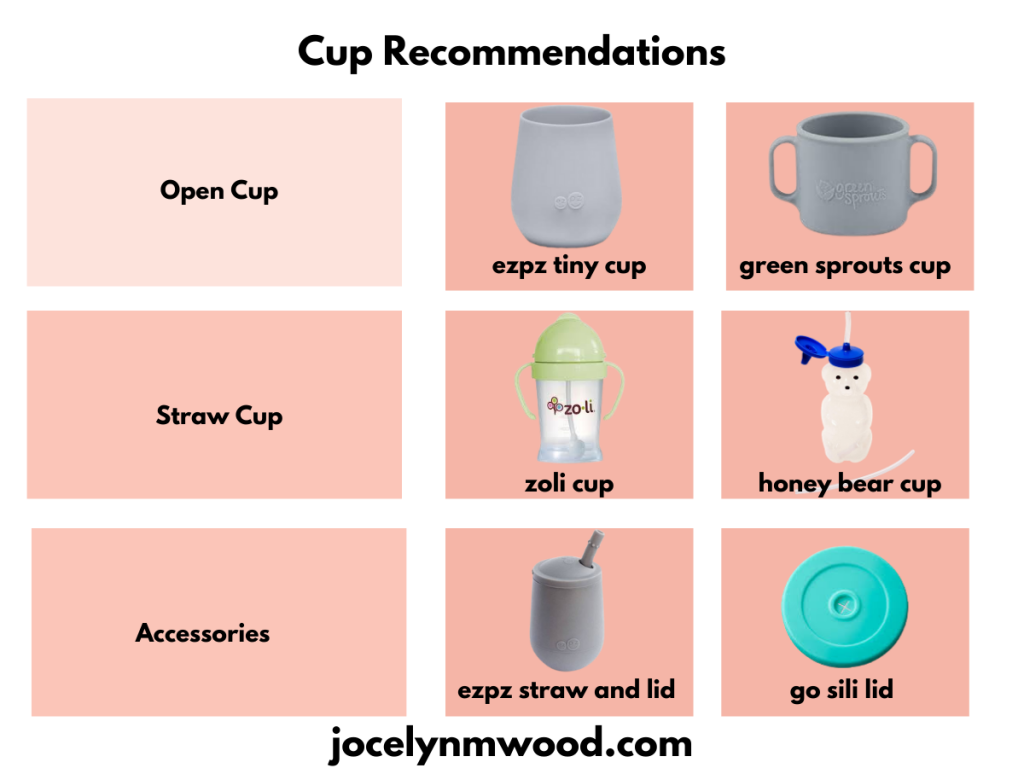
Open Cups
When you are at home and have the time, practicing with an open cup will aid your child’s oral motor development. Although plastic shot glasses are a good starting point, you’ll soon be looking for a more sustainable option.
EZPZ Tiny Cup: Designed by a speech therapist, this cup has a weighted base and little bumps on the bottom to help prevent it from tipping over. It’s the perfect size for your little one’s tiny hands and mouths.
Green Sprouts Training Cup: Handles make this easy for your baby to grab onto and bring towards their mouth. A slightly larger opening allows for more freedom of movement, but also more spills.
Straw Cups
When you are out and about, you may want a more spill-proof option. These straw cups provide the right level of support that your child needs to learn to drink from a straw.
Zoli Weighted Straw Cup: With a cover to minimize spills, and a straw that is sized “just right” for your baby’s mouth, the Zoli cup is a great way for children to get sips on the go.
Honey Bear Cup: Originally designed for a therapeutic setting, the Honey Bear Cup is a great way to teach little ones how straws work. By pressing on the bear’s belly, you can help your baby drink from a straw before they have figured it out on their own. Once baby learns to use the straw, however, you may want to cut the straw tip to better fit baby’s mouth.
Accessories
If you want to one and done this whole cup drinking thing and just go for one cup that can be easily transitioned between open cup and straw cup, these lid sets can be super helpful.
Have you transitioned your little one to a cup yet? I would love to hear about your experiences. Drop a line below, or find me on Instagram @speechwithjwo.


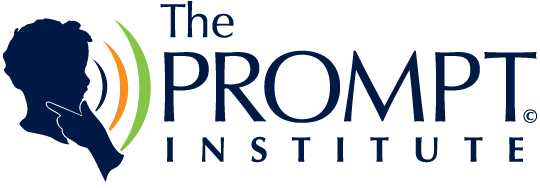
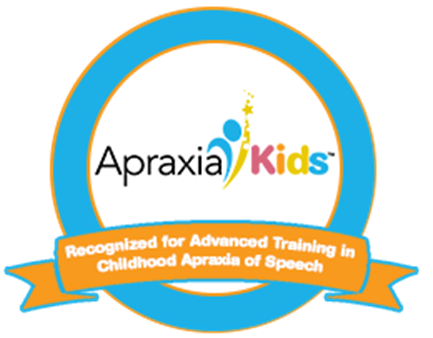

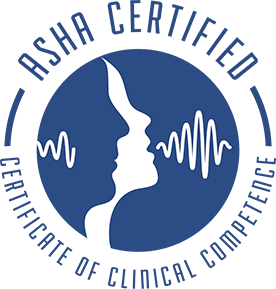
0 Comments